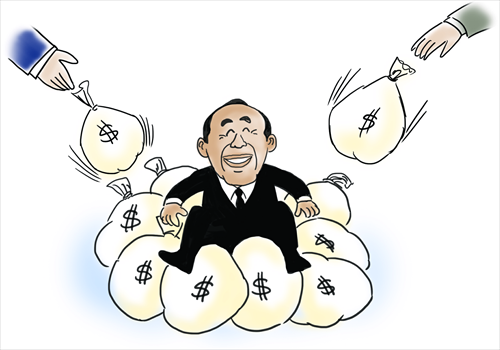Zimbabwe looks to Japanese aid amid economic woes

Illustration: Liu Rui/GT
In late December, Zimbabwe announced that it would make the Chinese yuan legal tender given its economic stagnation and the legacy of hyperinflation. In exchange, the Chinese government promised to cancel debts worth about $40 million.
In late March, Zimbabwean President Robert Mugabe visited Japan, where he got a 600 million yen ($5 million) grant-in-aid pledge from his Japanese counterpart Shinzo Abe. Within these three months, we can see how Mugabe, who is known for his work against colonialism, has utilized his country's relations with both China and Japan and reaped rich profits.
Besides investment issues, Japan is also trying to build consensus for its plan to reform the UN with Mugabe. Japan prides itself on its democratic achievements, and uses them as a basis for foreign assistance activities. Then why would Japan choose to cooperate with Mugabe?
No matter whether it is in 2015 when a Chinese group awarded Mugabe the Confucius Peace Prize or when Abe warmly received the world's oldest leader who turned 92 in February, what both China and Japan favor is Mugabe's past reputation as a hero who fights against colonialism who in that regard is next only to the late Nelson Mandela, Africa's most respected head of state. Meanwhile, Zimbabwe assumed presidency in August, 2014 of Southern African Development Community and chaired the African Union in January, 2015.
Zimbabwe gained independence in 1980. Mugabe has been serving as president since 1987 and he has been in the office for six terms. However, due to his autocratic rule, the country has been hit by economic sanctions imposed by Western countries.
Inflation has been rampant in Zimbabwe. In June 2015, the country got rid of its old currency and adopted the US dollar as its official currency, becoming one of the world's most poverty-stricken countries that has sovereignty but no currency of its own.
In 2000, Zimbabwe began to seize white farmers' land and it was suspended from the Commonwealth in 2002, making its relations with the West tense.
Meanwhile, Mugabe opposes what he calls "white rule" and is dissatisfied with UN reforms. It gets fewer and fewer benefits from the UN system. Since it has no currency of its own, no democracy and no economy, it welcomes various forms of assistance offered by foreign NGOs and especially those from China and Japan.
In the 1980s, Japan assisted Zimbabwe mainly through road and telecommunication construction. Based on these projects, Japan added livelihood projects such as increasing food production, building mobile libraries for young people, and offering facilities for media production. Since the 21st century, it has been involved in projects such as waste water disposal facilities construction and urban geographic information database planning.
From a geopolitical point of view, the Japanese government has noted that Zimbabwe has been included into the Southern African Development Community and plays an important geographic role in the economic unification process of southern African regions. Given Zimbabwe's hyperinflation and economic standstill, Japan has to take into consideration southern Africa's interests and stability and resort to approaches different from Western countries.
Therefore, in accordance with the Zimbabwe Agenda for Sustainable Socio-Economic Transformation issued by the Zimbabwean government in 2013, Japan aims at promoting transformation in the country's sustainable development by assisting in basic infrastructure, human resources, food security and poverty alleviation. The mid-term objectives include basic infrastructure construction that southern Africa badly needs, effective exploration of mineral resources and talent cultivation in public service sectors such as tourism and sightseeing.
The Sixth Tokyo International Conference on African Development will be held in Kenya in August. To ensure the success of this Japan-led summit, Japan had to woo Mugabe and make use of Zimbabwe's call for UN reforms and its stance against white economic dominance. Japan even wants to use this chance to meet its demand of becoming a permanent member of the UN Security Council.
Facing Japan's petty maneuver, China can stay at ease and be a bystander. Yet Japan's foreign assistance approach that stresses livelihood and utilizes regional advantages is worth learning from.
The author is Executive Dean of Institute for Disaster Management and Reconstruction, Sichuan University - Hong Kong Polytechnic University. opinion@globaltimes.com.cn Follow us on Twitter @GTopinion